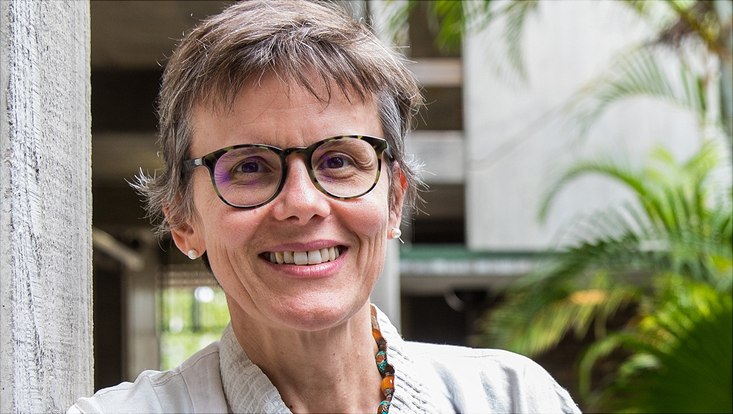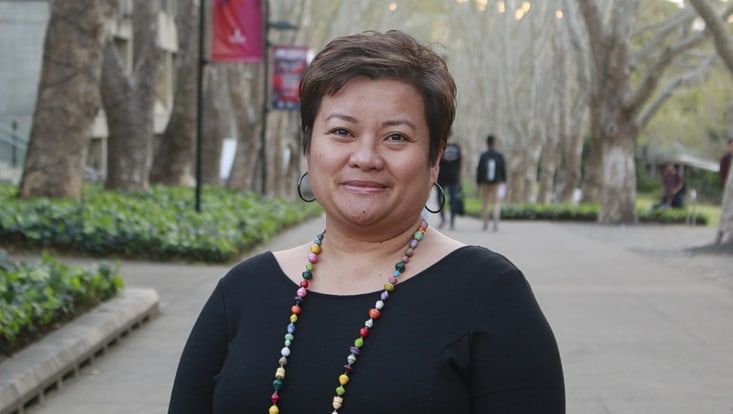"If you do not feel represented linguistically, you quickly lose the desire to participate in society."
20 June 2022

Photo: UHH/privat
As part of our interview series with visiting scholars, the International Office spoke with Prof. Ingrid Piller from Macquarie University.
Ingrid Piller is a professor of applied linguistics at Macquarie University in Sydney, Australia. A sociolinguist with research experience in intercultural communication, language learning, multilingualism, and bilingual education, Piller is the project leader of the Next Generation Literacies faculty network for Universität Hamburg’s partner university Macquarie University. The Next Generation Literacies project is based in the Literacy in Diversity Settings (LiDS) research center. The 2018 recipient of the Anneliese Maier Research Award visited Hamburg in May and June, where we met her for an interview shortly before her departure. As Prof. Piller is a native of Germany, we spoke in German - this is the translated version of the interview.
International Office: Dear Prof. Piller, it is nice that you were able to come to Hamburg once again after such a long period due to the coronavirus pandemic.
Ingrid Piller: Yes, I am also very happy that it worked out—even though I had planned a much longer research stay. But I am very happy to finally meet up with the LiDS team and my Hamburg network colleagues in person again. In certain respects, exchanging in person is superior to doing so digitally. Although, I have to say that the measures of digital communication and collaboration forced by the pandemic were not all bad for our network; they also presented us with new possibilities that we had not considered before.
Can you be more specific about that?
Organizing an international network like Next Generation Literacies is obviously very time-consuming, and communication among the different members of the project across space and time boundaries is a challenge. Before the coronavirus pandemic, we primarily thought in terms of many intercontinental visits. The possibilities presented to us by video communication software since the beginning of 2020 have naturally shaken up this paradigm—simply by changing our habits, requirements, and ideas with regard to collaboration. Having a monthly network-leadership meeting drives the project tremendously and has really moved us along. We should definitely take this lesson into the post-coronavirus era.
Could you please describe the research focus of the network in which you work together with, among others, Ingrid Gogolin, Sílvia Melo-Pfeifer, and Zheng Yongyan from Fudan University in Shanghai, among others?
Gladly. Universität Hamburg’s cooperation with Macquarie University and Fudan University has been in place for many years. As part of the Next Generation Partnerships initiative funded by Universität Hamburg, the Faculty of Education—in cooperation with Macquarie University and Fudan University—then submitted the Next Generation Literacies project and it was accepted for funding. In the network, we focus on research on linguistic diversity, especially in monolingual contexts or traditions, and how this relates to social participation and access in the areas of education, health, employment, and law. For this, Germany, Australia, and China are particularly well suited for empirical comparative approaches, as all 3 countries officially consider themselves to be primarily monolingual but, in reality, are linguistically very diverse due to immigration, indigenous minorities, and globalization. Apropos, since last year, a program within the Hamburg International Summer School has been dedicated to our research focus on linguistic diversity. This year, the virtual summer school Language Diversity will take place from 11 July to 5 August.
By the way, I would like to mention an additional positive effect of the coronavirus pandemic: it has been possible to cover the participation fees for participants from low- and middle-income countries due to the fact that we were unable to spend a lot of the funding that was awarded for travel. Funds are currently still available, and those interested can apply regularly!
That is really great and underlines your statement that positive things have also come out of the coronavirus pandemic. Can you tell us what you are currently working on in your research within the network?
Basically, my research explores what consequences language has for social participation. For example, in a recently published project, we examined how schools in Australia deal with linguistically diverse parents. Specifically, my colleagues Ana Sofia Bruzon, Hanna Torsh, and I collected data on how the 30 schools we studied—all of which have catchment areas with more than 50 percent non-English-speaking households and up to 98 percent in some areas—reach out to parents who need to register their children at the school for the upcoming school year. The results were startling: monolingual logic predominates even though Australian law states that individuals have the right to communicate in their own language! When contacting the authorities and the like, non-English-speaking people can use the Translating and Interpreting Service; but schools are communicating only in English. "Monolingual school websites as barriers to parent engagement" provides a summary of the study.
This sounds like important field research as well as vital findings that, hopefully, will serve as an incentive to make changes in this area.
Yes, it is crucial for democracy that people living in a nation-state can communicate with each other. After all, that is what democracy is about: talking to each other. Those who feel linguistically isolated or unrepresented quickly lose the desire to participate in society.
Thank you for this powerful appeal, which once again highlights the importance of conducting research on this topic. And finally, our standard question about Hamburg: What do you like about the port city?
Basically, I find Hamburg to be a cosmopolitan city—its status as gateway to the world certainly has determined this for centuries. On a very personal level, but still related to my research interest, I am always fascinated by the sayings on the public garbage cans. I actually photograph and collect these sayings. For me, it’s such a creative example of linguistic landscapes (laughs).
Thank you for your time and the interview.
Find more information about Universität Hamburg’s Next Generation Partnerships initiative, within which the Next Generation Literacies network is being funded for the period 2021–2023.
Visit Ingrid Piller’s award-winning blog Language on the Move, which examines multilingualism in the context of globalization and migration.
Click here for a recent interview with Ingrid Piller by Macquarie Uniersity.


